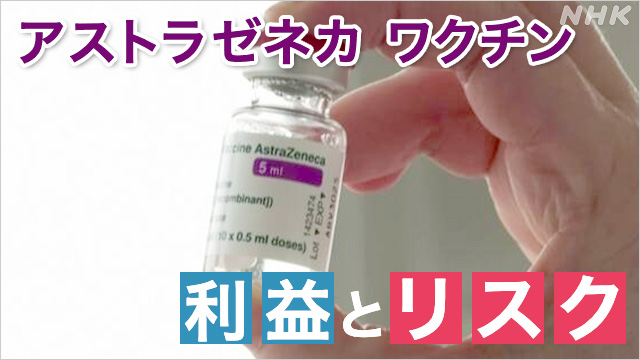A vaccine developed by British pharmaceutical giants AstraZeneca and Oxford University.
Approval applications for use are also being made in Japan.
The relationship with blood clots has been pointed out, but what about the reality?
Used in more than 70 countries and regions around the world Approval pending in Japan
AstraZeneca's vaccine is a type called "viral vector vaccine", in which the gene that makes the protein of the new coronavirus is incorporated into another harmless virus and administered together with the virus.
Used in more than 70 countries and territories around the world, AstraZeneca has signed a contract with the Government of Japan to supply 60 million people and is applying to the Ministry of Health, Labor and Welfare for approval.
Report of "thrombus" after inoculation
Regarding this vaccine, in March 2021, the EU = European Union drug regulators reported cases where blood clots, "thrombus", etc. were confirmed after inoculation, and it was temporarily taken as a preventive measure in Germany, France and other European countries. , There were movements such as suspending inoculation.
"The risk of infection outweighs the benefits of vaccination"
The results of the EMA = European Medicines Agency survey were published on April 7, 2021.
According to the EMA, many cases of blood clots after vaccination have been reported in women under the age of 60 within 2 weeks of the first vaccination.
Although it may be related to the immune response of the vaccine, it is extremely rare, so the benefits of vaccination outweigh the risks of being infected with the new coronavirus.
Also, according to a UK regulatory survey, of the 202 million doses of vaccinations given in the UK by the end of March, 79 had blood clots confirmed after vaccination, of which 19 died.
Of the 19 people who died, 11 were under the age of 50, and three of them were under the age of 30.
Each country limits the age of vaccination
How are each country responding to these findings?
The British government has announced that it recommends another vaccination for people under the age of 30.
In addition, Italy has announced that it will limit vaccination against AstraZeneca vaccines to people over the age of 60.
However, for those who received the first vaccination, even if they are under 60 years old, they will proceed with the second vaccination.
It also announced that it will be limited to people between the ages of 60 and 65 in Spain.
In addition, France has announced that it will promote vaccinations for people aged 55 and over, and Germany for people aged 60 and over.
WHO "Evaluate compared to mortality risk"
According to UK regulatory findings, the risk of blood clots is about 4 in 1 million and the risk of death is about 1 in 1 million.
The WHO (World Health Organization) issued a statement on this, noting that more detailed research is needed, and said, "Rare adverse events must be evaluated against the risk of dying from infection with the new coronavirus. It will not be. "
Expert "Carefully consider Japan, which should avoid risks as much as possible"
Tetsuo Nakayama, a specially appointed professor at Kitasato University who is familiar with vaccines, said, "We must carefully look at whether there is a causal relationship, but we should avoid risks as much as possible and limit the age of vaccination until the cause is clear. I think the response of each country is appropriate. It will be necessary to carefully consider it in Japan in the future. "

